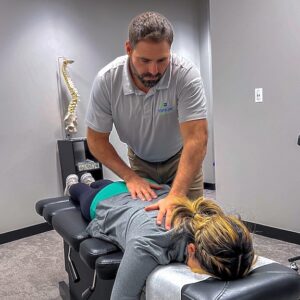In the realm of non-invasive therapies, Soft Wave Therapy has emerged as a potential game-changer. This innovative treatment method is garnering attention for its ability to address various musculoskeletal conditions without invasive procedures. But how safe is Soft Wave Therapy as a non-invasive treatment option? Let’s delve into this groundbreaking therapy to understand its safety profile and effectiveness.
Understanding Soft Wave Therapy
Understanding Soft Wave Therapy is crucial in appreciating its innovative approach to treating various conditions. Also referred to as Extracorporeal Shock Wave Therapy (ESWT), this cutting-edge treatment method has gained recognition in orthopedics, sports medicine, and rehabilitation practices. The fundamental principle of Soft Wave Therapy near me lies in its non-invasive nature, utilizing acoustic or shock waves to trigger the body’s innate healing mechanisms. These waves are strategically directed towards specific areas afflicted by pain or injury, penetrating deep into the tissues. By focusing on the affected region, Soft Wave Therapy aims to stimulate cellular repair and regeneration processes. This precise targeting of damaged tissue allows for enhanced blood circulation, activation of cellular repair mechanisms, and the release of growth factors, ultimately facilitating accelerated healing.
Moreover, Soft Wave Therapy’s efficacy lies in its ability to harness the body’s natural responses to promote recovery. The acoustic waves utilized in this therapy are tailored to each patient’s needs, adjusting the intensity and frequency to suit the severity and nature of the condition being treated. This customization ensures that the therapy remains gentle yet effective, providing a non-invasive alternative to surgical procedures. By promoting tissue regeneration and reducing inflammation, Soft Wave Therapy aids in alleviating pain and restoring functionality. Its non-surgical and non-pharmacological approach makes it an appealing option for individuals seeking holistic and minimally invasive solutions to various musculoskeletal ailments.
Safety Profile of Soft Wave Therapy
One of the primary concerns when exploring any treatment is its safety. Soft Wave Therapy has gained traction due to its minimal invasiveness and relatively low-risk profile compared to surgical interventions. It doesn’t involve incisions, anesthesia, or the risks associated with surgical procedures.
Studies on Soft Wave Therapy have reported minimal adverse effects, mostly limited to mild discomfort during or after the treatment session. These effects tend to be transient, with no long-term complications observed in most cases.
Furthermore, Soft Wave Therapy is FDA-approved for various conditions, indicating its safety and efficacy when performed by trained professionals. However, individual responses to treatment may vary, and it’s essential to consult with a qualified healthcare provider to assess candidacy and potential risks.
Conditions Treated with Soft Wave Therapy
Soft Wave Therapy has shown promising results in treating various musculoskeletal conditions, including:
Tendon Injuries: Soft Wave Therapy stands as a reliable treatment option for a wide range of tendon injuries, including Achilles tendonitis, patellar tendonitis, and tennis elbow (lateral epicondylitis). This therapy offers targeted shock wave treatment to the affected tendons, promoting healing and reducing pain. It works by stimulating the body’s natural healing mechanisms, accelerating tissue repair, and enhancing the overall structural integrity of injured tendons. By fostering collagen production and increasing blood flow to the affected areas, Soft Wave Therapy effectively contributes to the restoration of optimal tendon functionality.
Plantar Fasciitis: Soft Wave Therapy has emerged as an effective treatment approach for addressing the persistent discomfort associated with plantar fasciitis. This condition involves inflammation and micro-tears in the plantar fascia—a thick band of tissue connecting the heel bone to the toes. The therapy involves targeted shock waves that help in reducing inflammation, promoting tissue repair, and restoring mobility. By encouraging cellular regeneration and decreasing pain sensitivity in the affected area, Soft Wave Therapy offers a non-invasive and efficient option for individuals seeking relief from plantar fasciitis symptoms.
Muscle Strains and Tears: Soft Wave Therapy plays a pivotal role in rehabilitating muscle strains and tears by delivering focused acoustic waves to the injured muscle tissues. This therapy aids in enhancing blood circulation, promoting tissue regeneration, and reducing pain and swelling. By facilitating the repair process and diminishing muscle tension, Soft Wave Therapy accelerates the recovery timeline, allowing individuals to regain muscle strength and mobility more effectively.
Joint Pain from Osteoarthritis: Soft Wave Therapy presents a promising non-surgical alternative for managing joint pain associated with osteoarthritis. By targeting affected joint areas with shock waves, this therapy assists in reducing pain, improving mobility, and enhancing overall joint function. Moreover, it has shown potential in slowing down the degenerative process of osteoarthritis, offering relief and improved quality of life to individuals dealing with chronic joint discomfort.
Calcific Tendonitis: Soft Wave Therapy provides a beneficial solution for individuals experiencing calcific tendonitis, particularly in the shoulder region. This condition involves the accumulation of calcium deposits within tendons, leading to inflammation and restricted movement. The therapy’s targeted shock waves effectively break down these deposits, reduce inflammation, and stimulate the body’s natural mechanisms to eliminate calcium buildup. Consequently, it alleviates pain, restores range of motion, and improves shoulder functionality.
Rotator Cuff Injuries: Soft Wave Therapy McHenry is an effective treatment option for rotator cuff injuries, which commonly result in shoulder pain and limited mobility. By promoting cellular repair processes and encouraging tissue regeneration, this therapy aids in pain reduction, accelerates healing, and restores strength and mobility in the affected shoulder area.
Stress Fractures: Soft Wave Therapy facilitates the healing of stress fractures, which occur as small cracks or severe bruising within bones due to repetitive stress or overuse. By stimulating bone healing and regeneration, this therapy reduces pain and expedites the return to regular activities for individuals affected by stress fractures.
Epicondylitis (Golfer’s Elbow): Similar to its effectiveness in treating tennis elbow, Soft Wave Therapy showcases positive outcomes in managing golfer’s elbow or medial epicondylitis. By delivering shock waves to the affected area, it reduces pain, promotes tissue repair, and enhances overall elbow function for individuals experiencing discomfort due to this condition.
Hip Bursitis: Soft Wave Therapy has demonstrated promising results in managing hip bursitis, a condition characterized by inflammation of the bursae in the hip joint. By reducing inflammation, promoting healing, and alleviating pain, this therapy contributes to restoring comfort and mobility for individuals affected by hip bursitis.
Chronic Trigger Points: Soft Wave Therapy offers relief for individuals suffering from chronic trigger points or muscle knots, leading to localized tenderness, discomfort, and restricted movement. By targeting these areas, the therapy relaxes muscle tension, improves blood circulation, and alleviates pain. It aids in muscle recovery, enhances flexibility, and contributes to an overall improvement in the affected muscle’s condition.
Patellar Tendinopathy (Jumper’s Knee): Soft Wave Therapy has garnered attention for its potential efficacy in addressing patellar tendinopathy, commonly known as jumper’s knee. This overuse injury affects the tendon connecting the kneecap to the shinbone and often causes pain and stiffness. The therapy involves the application of targeted shock waves to the affected area, aiming to stimulate the healing process. By initiating a reparative response in the damaged tendon, Soft Wave Therapy aids in reducing pain, promoting collagen synthesis, and enhancing tendon strength. This non-invasive approach shows promise in assisting athletes and individuals plagued by the persistent discomfort associated with this condition.
Frozen Shoulder (Adhesive Capsulitis): Soft Wave Therapy emerges as a potential solution for frozen shoulder, a debilitating condition characterized by pain and restricted motion in the shoulder joint. By focusing shock waves on the affected area, this therapy aims to alleviate pain, reduce inflammation, and improve range of motion. It stimulates tissue repair and modulates the inflammatory response, facilitating a faster recovery process for individuals grappling with the limitations imposed by frozen shoulder.
Morton’s Neuroma: Soft Wave Therapy offers a novel approach in managing Morton’s neuroma, a painful condition affecting the ball of the foot, typically between the third and fourth toes. This therapy involves directing shock waves toward the neuroma area, which can help in reducing pain, suppressing nerve irritation, and stimulating tissue healing. By promoting cellular regeneration and mitigating the discomfort associated with this foot condition, Soft Wave Therapy provides potential relief for individuals hindered by Morton’s neuroma.
Fascial Pain Syndromes: Soft Wave Therapy presents a promising avenue for individuals grappling with chronic fascial pain syndromes, including myofascial pain syndrome or fibromyalgia. By targeting trigger points and areas of muscular tension with shock waves, this therapy aids in relaxing tight muscles, improving blood circulation, and modulating pain perception. It contributes to the relief of localized discomfort and stiffness associated with these conditions, enhancing overall comfort and mobility for affected individuals.
Calcaneal Spur (Heel Spur): Soft Wave Therapy showcases potential in addressing the discomfort stemming from calcaneal spurs, which are bony protrusions that develop on the underside of the heel bone. By delivering shock waves to the affected area, this therapy works to reduce inflammation, alleviate pain, and stimulate tissue repair. By fostering the healing process and diminishing the discomfort associated with this condition, Soft Wave Therapy offers a non-invasive option for individuals seeking relief from heel discomfort caused by calcaneal spurs.
The Effectiveness of Soft Wave Therapy
The effectiveness of Soft Wave Therapy extends beyond its safety profile, showing promising results in promoting healing and alleviating pain across various musculoskeletal conditions. Research and clinical observations have indicated that a substantial number of patients undergoing Soft Wave Therapy treatments have reported notable improvements in their conditions. This non-invasive therapy has demonstrated the ability to stimulate the body’s natural healing mechanisms, leading to enhanced tissue repair and regeneration. Moreover, it has showcased efficacy in reducing pain levels, fostering increased mobility, and improving overall functionality for many individuals. While numerous patients experience significant relief from their symptoms, it’s essential to acknowledge the variability in responses among individuals. Not all patients respond uniformly to Soft Wave Therapy, and the degree of improvement may differ based on several factors, including the specific condition being treated, the individual’s overall health, and the severity of the ailment.
Is Soft Wave Therapy Safe?
Soft Wave Therapy stands as a promising non-invasive treatment option with a favorable safety profile for various musculoskeletal conditions. While it’s generally considered safe, individual suitability and outcomes may differ. Consultation with a qualified healthcare professional at Evolve Chiropractic of McHenry can provide personalized insights and recommendations tailored to individual needs.
Embracing advancements in non-invasive therapies like Soft Wave Therapy signifies a shift towards holistic and effective treatment options. As with any medical intervention, understanding its safety and efficacy is crucial for making informed decisions about one’s healthcare journey.
Why Choose Us?
Discover relief and rejuvenation at Evolve Chiropractic of McHenry, where soft wave therapy takes center stage in our commitment to your health. Our skilled team focuses on delivering targeted, drug-free pain management and healing through innovative soft wave technology. Nestled in the heart of McHenry, our clinic aims to transform your health journey by offering tailored treatment plans and compassionate care, ensuring you evolve towards a life free from discomfort.
3923 Mercy Dr Ste A, McHenry, IL 60050, United States
(815) 271-5901
https://myevolvechiropractor.com/locations/chiropractor-in-mchenry-illinois/





